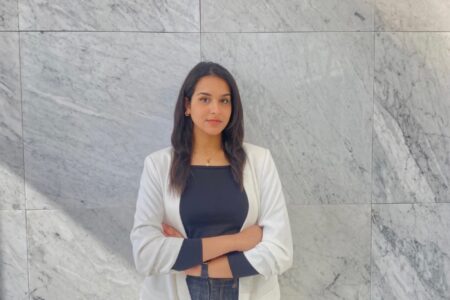
Getting a sponsorship from a company in the US is hard, but it isn’t impossible with the right job hunting strategies.
We’ve heard from motion graphic designer Avalynn Kim, who has worked on projects like “Barbie,” “Squid Game,” and “CyberPunk: Edgerunners.” It was her award-winning work for “Barbie” that helped her secure an O-1B visa — granted to foreign nationals who have demonstrated extraordinary achievement in the motion picture and television industry.
Then, there’s product deployment strategist Jahnavi Shah, who knew that finding a company to sponsor a job visa in the US was hard, but managed to bag one anyway by taking up several internships with a diverse background in the job scope.
Meanwhile, it took Mohammed Wasim over 1,000 job applications and failing to secure a single interview to realise he was using the wrong job hunting strategies.
The thing is, Wasim did exactly what Shah did — participated in several internships and even worked part-time on campus.
However, many, many, many applications later, he figured it out: “It took a while for me to realise the two reasons for my failure; I was not reaching out to hiring managers for opportunities, and I was not tailoring my resume to the jobs.”

As a part of his job as a Senior Data Insights Analyst, Wasim turns complex data into actionable insights that help steer business strategy. Source: Mohammed Wasim
‘I was a complete introvert, and I was hesitant to ask for help’
Wasim is no stranger to successfully applying for jobs; in fact, he has two years of work experience before moving to the US to pursue an MSc in Data Science at Illinois Institute of Technology (IIT).
“As soon as I completed my undergraduate degree at a local university in India, I got a job as a data analyst at BYJU’s, a global ed-tech company,” says Wasim. “However, it took a long time for me to get a job in the US after completing my master’s.”
It’s a struggle many international students know well — the job market will always prioritise the locals first, as they don’t require any visa sponsorships.
Still, as long as you use the right job hunting strategies, things might go in your favour.
“I wasn’t hearing back from anyone for three months, so I had to change my strategy,” says Wasim. “I started applying for contract jobs to be financially stable while looking for a full-time job, and later on, I found a company willing to sign a 10-month contract with me while on my OTP visa.”
However, Wasim still needed to secure a long-term job, so he kept applying and desperately waited to hear back.

During his master’s, Wasim participated in several data analyst internships, mentorships, and ambassadorships. Source: Mohammed Wasim
Concerned by the lack of responses, Wasim finally realised that something wasn’t adding up.
It took him a while, but he finally figured that not reaching out to hiring managers for opportunities and not tailoring his resume to the jobs was a big mistake.
“I was a complete introvert, and I hesitated to ask for help. I kept questioning myself, ‘What if they don’t reply?’ or ‘What will they think about me messaging them?’ It was hard,” Wasim shares. “My resume was another issue I had to fix.”
And by fixing those glaring problems, Wasim saw results in no time.
“I reached out to the hiring manager of my current company and told them that I was determined to apply for the position,” he shares. “I sent over my resume, and they looked at it. I was invited for an interview, and the next thing you know, I was offered the job.”
While getting the job was Wasim’s biggest triumph, it did not guarantee him an H-1B visa — the foreign worker visa in the US that allows employers to hire foreign workers in so-called speciality occupations.
He took up the offer anyway, determined to prove his worth through this work.
“I was consistent at work, and I was also delivering the projects up to expectations,” he says. “Just seven months after working for them, they agreed to sponsored my visa.”
Today, Wasim works for Molson Coors Beverage Company as a senior data insights analyst.

Wassim believes that every rejection is a step closer to your goal. It might not seem like it, but it is. Source: Mohammed Wasim
4 job hunting strategies every international student should know about
Having successfully reached the finish line of his job hunt, Wasim has four key job hunting strategies to share with international students who are on their own journey.
Know what you’re applying for
If you’re thinking about going in blind when applying for jobs, you will probably struggle to bag them.
“A common mistake many make is applying for hundreds of jobs without knowing the requirements or tailoring their resumes to the job description,” says Wasim. “When I started applying for jobs, I did just that and barely got any responses.”
Job descriptions are there for a reason: they outline specific skills and requirements an employer needs. You’re unlikely to advance to the next stage if your qualifications don’t match.
Understanding it will allow you to assess your suitability for the role and prepare for potential interviews, increasing your chances of securing the position.
Get them referrals or recommendation letters
While having referrals won’t guarantee a job, they can help you increase the odds of your applications getting seen by a recruiter or a hiring manager, potentially speeding up the hiring process on your suitability for the role.
As a referral comes from a trusted source, such as professors, previous employers, or managers, it can demonstrate your suitability for the role and the company. Plus, it gives you a boost over other candidates.
“If you’re applying for a senior data analyst job like I did, it’s best to approach someone in the same team as your past or current company to write you a referral letter,” advises Wasim. “Implementing this as one of your job-hunting strategies will help you as an international student looking for jobs abroad.”
“Also, the higher the position of the person writing your letter, the better.”

Wasim at the Paterson Great Falls National Historical Park in Paterson, New Jersey, US. Source: Mohammed Wasim
Avoid applying for non-sponsored employment
Applying for jobs that don’t offer to sponsor your work visa isn’t the best use of your time and efforts.
Yes, it’s a safe bet if you apply for as many jobs as possible; if they end up not offering you a visa, then you have wasted an entire application process.
“There are a lot of websites you can use to find jobs that offer work visa sponsorships in the US,” says Wasim. “That’s how I started with my job search.”
Network with people
As an international student, meeting new people and building relationships with those around you will benefit you in the long run. It will lead you to find unadvertised job openings, expand opportunities, gather insights into the local job market and culture, and build a support system.
“A lot of people ignore networking nowadays, which is one of the most important job-hunting strategies,” says Wasim.
Networking can also lead to referrals, which as we mentioned above, increases your chances of scoring an interview or job offer.
There are several ways to build networks and connections, such as attending conferences and career festivals or sending cold emails or LinkedIn messages.
“People will be willing to help you, especially if you reach out to the right person,” says Wasim. “They’ll guide you on your journey to getting a job abroad.”










